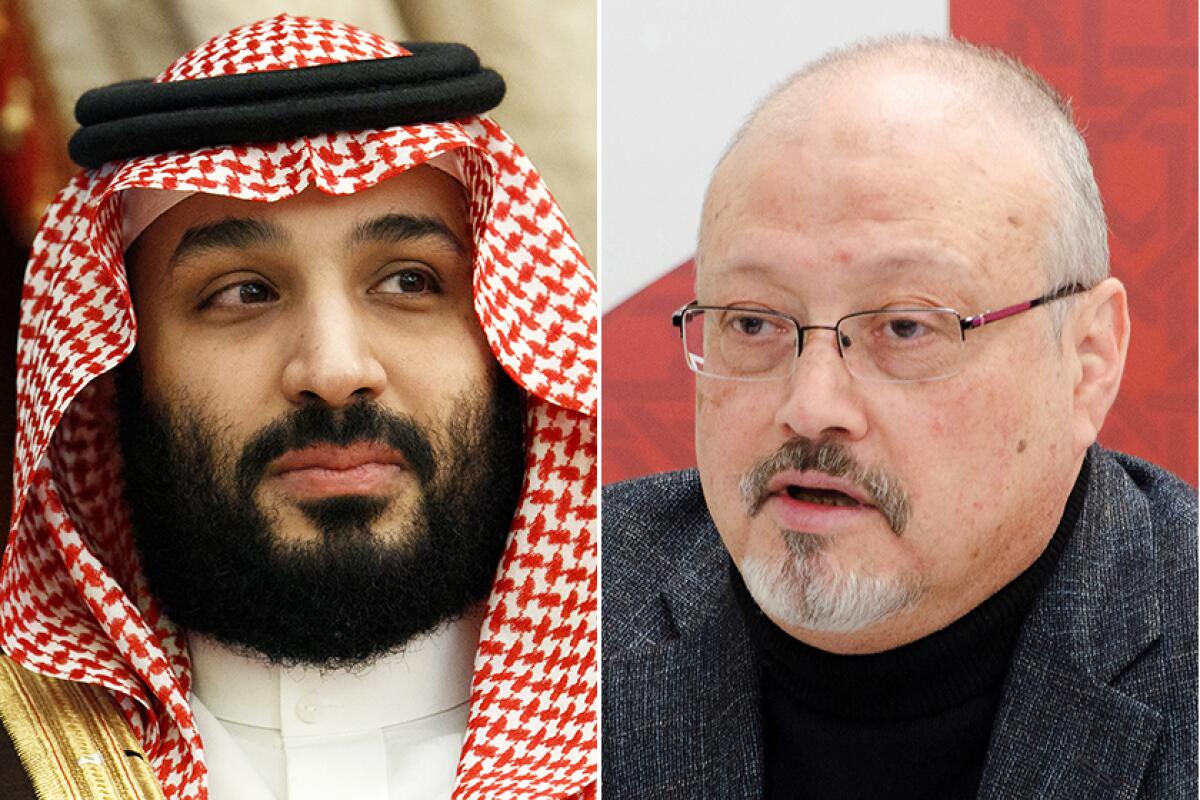Op-Ed: It’s official. Mohammed bin Salman is responsible for Jamal Khashoggi’s murder. Hold him accountable

- Share via
It’s official: Mohammed bin Salman is responsible for Jamal Khashoggi’s murder. That’s the inescapable conclusion from the declassified intelligence report released by the Biden administration on Friday. The report, issued by the office of the director of national intelligence, concludes that the Saudi crown prince “approved” the operation that resulted in the brutal murder of the Saudi journalist, dissident and U.S. resident two years ago.
Release of the intelligence assessment is an important step in revealing the truth about Khashoggi’s assassination. Unfortunately, the Biden administration has also decided to impose no meaningful penalty against Bin Salman. The president’s failure to fulfill his campaign promise to make all those responsible “pay the price” for Khashoggi’s death has far-reaching ramifications across the region and in this country too. In letting the crown prince escape direct penalty, Biden has sent a message to despots and dictators everywhere that America hands out free passes to select high-ranking “friends” when it comes to extrajudicial killing of perceived enemies, including U.S. residents.
The national intelligence director’s report resulted from a tit-for-tat struggle between Congress and the Trump administration over whether to reveal the government’s assessment that Bin Salman was behind the killing of Khashoggi on Oct. 2, 2018, at the Saudi Consulate in Istanbul. President Trump was able to fend off congressional demands for a U.S. response to the assassination by stonewalling and vetoing legislation to ban arms sales to the Saudis, pushed in part by outrage at the brazen killing. Congress eventually settled for a less frontal attack, tucking a provision into the 2020 National Defense Authorization Act requiring the director of national intelligence to produce a declassified report of evidence about, and names of Saudi officials deemed responsible for, Khashoggi’s death.
Belatedly, in February 2020, the then-director of national intelligence issued the mandated report but, in defiance of the legislation, refused to issue a declassified version, claiming that doing so would jeopardize “sources and methods.” In an important step toward transparency, the Biden administration reversed course with Friday’s release of the intelligence report.
At the same time, the Biden administration announced the “Khashoggi Ban,” excluding from the United States “individuals who, acting on behalf of a foreign government, are believed to have been directly engaged in serious, extraterritorial counter-dissident activities.” The State Department promptly put 76 Saudis on the inaugural list for “threatening dissidents overseas, including but not limited to the Khashoggi killing.” In addition, the Treasury Department levied financial sanctions against the former deputy head of the Saudi General Intelligence Presidency and the Saudi Rapid Intervention Force, deemed to have been “directly involved in Khashoggi’s murder.”
The ban and the sanctions are a welcome step toward imposing a significant cost on midlevel culprits involved in the state apparatuses of oppression. But the ironic twist to the administration’s high-mindedness — that the sanctions don’t apply to the man with the real power to permanently silence dissidents — undermines the whole enterprise. The Biden administration’s decision against penalizing Bin Salman exposes the sanctions as a political tool of expedience, unmoored from the merits of who deserves them.
Basic justice requires the Biden administration to impose on the Saudi crown prince the same punishments levied against his foot soldiers. In addition, the administration should extend its temporary freeze on arms sales to Saudi Arabia as long as Bin Salman, who has proven himself violent, volatile and unreliable, remains defense minister and in charge of the Saudi arsenal. To match its expressed concern for the Khashoggi family, the Biden administration should also demand that the Saudis reveal the location of Khashoggi’s body.
But no. The administration’s plan to “recalibrate” relations with Saudi Arabia has eclipsed the prerequisites of justice for Khashoggi.
Well-meaning senior officials and pundits have patiently explained the realpolitik and national security concerns that factored into the decision to let Bin Salman walk, most importantly, a determination not to upset the delicate balance of power in the Mideast by damaging our longstanding alliance with the Saudis. They should also understand the realpolitik consequences of providing cover for a volatile and over-indulged crown prince who has established himself as a destructive and destabilizing force in the region. In just six years as defense minister, he has prosecuted an almost four-year blockade against U.S.-ally Qatar and launched a devastating, criminal war in Yemen that has destroyed the lives of millions and caused the largest humanitarian catastrophe in the world.
Exiled dissidents, including American residents, should have no illusions about what just happened. Given the opportunity to lay down the law for brutal autocrats everywhere who might contemplate sending hit squads abroad to kill dissidents, Biden and his advisors took a pass. The administration wouldn’t even go so far as to punish Bin Salman with the Khashoggi Ban alone, which would have been wholly symbolic as the crown prince, facing three lawsuits in federal courts, dares not set foot in the U.S. anyway.
With its “recalibrated” exceptions to justice, Biden has waived culpability for Bin Salman in Jamal Khashoggi’s murder and weakened the rule of law worldwide.
Michael Eisner is general counsel and Sarah Leah Whitson is executive director of Democracy for the Arab World Now, founded by Jamal Khashoggi.
More to Read
A cure for the common opinion
Get thought-provoking perspectives with our weekly newsletter.
You may occasionally receive promotional content from the Los Angeles Times.










